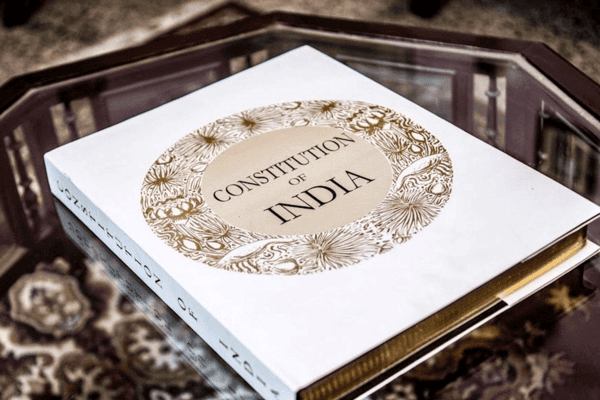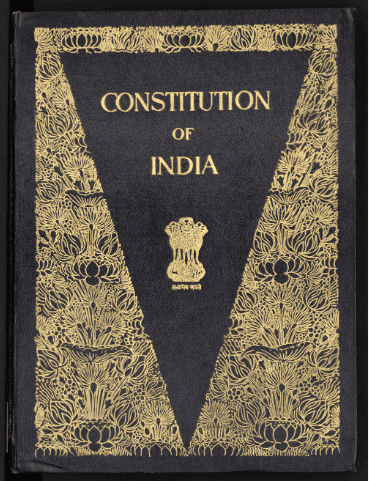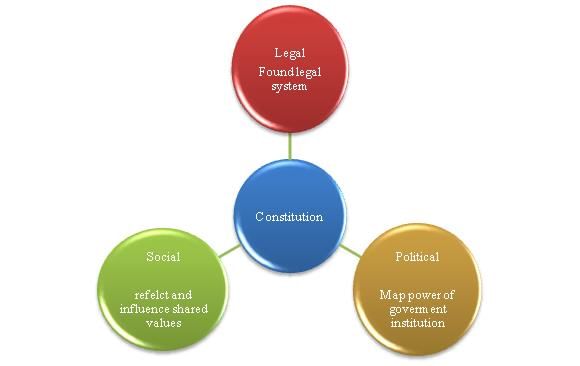|
The primary purpose of a constitution is to provide a foundational framework for governance, ensuring coordination, protection of rights, and guiding societal goals. |
Card: 2 / 46 |
|
The constitution limits the powers of government to protect citizens' freedoms. True or False? |
Card: 3 / 46 |
|
True. The constitution establishes basic rights that the government cannot violate, acting as a shield for citizens against government overreach.
|
Card: 4 / 46 |
|
The constitution allows for coordination and peaceful coexistence among diverse members of society by providing a framework of _____. |
Card: 5 / 46 |
|
What role does the constitution play in specifying decision-making powers within society? |
Card: 7 / 46 |
|
The constitution specifies the allocation of power, determining who has authority to make laws and policies, thus avoiding conflicts over rule-making.
|
Card: 8 / 46 |
|
Riddle: I set the limits for rulers and protect the rights of all, ensuring fairness prevails and chaos doesn't befall. What am I? |
Card: 9 / 46 |
|
According to the Indian Constitution, who ultimately holds power in a democratic society? |
Card: 11 / 46 |
|
Fill in the blank: The constitution empowers the government to tackle deep-rooted inequalities and ensure welfare measures such as ___ and ___ for all citizens. |
Card: 13 / 46 |
|
True or False: The constitution reflects a single ethnic identity for citizenship, similar to many countries. |
Card: 15 / 46 |
|
False. The Indian Constitution does not prioritize ethnic identity for citizenship, reflecting a broader conception of national identity. |
Card: 16 / 46 |
|
What function does the constitution serve in expressing the fundamental identity of a people? |
Card: 17 / 46 |
|
The constitution expresses the fundamental identity of a people by setting norms and principles that form their basic political identity, reflecting historical traditions and diverse groups. |
Card: 18 / 46 |
|
MCQ: Which of the following is NOT a function of the constitution? A) Establishing limits on government powers B) Ensuring the rule of law C) Providing for absolute power to the government D) Guiding societal aspirations |
Card: 19 / 46 |
|
True or False: The constitution of the United Kingdom is a single written document. |
Card: 23 / 46 |
 Unlock all Flashcards with EduRev Infinity Plan Starting from @ ₹99 only
|
|
False. The UK constitution is made up of a collection of documents and decisions. |
Card: 24 / 46 |
|
Fill in the blank: Successful constitutions are often created after ___ ___ ___. |
Card: 25 / 46 |
|
It was crafted by credible leaders who had public trust and reflected a national consensus. |
Card: 28 / 46 |
|
True or False: The constitution is only effective if it is fully implemented in practice. |
Card: 31 / 46 |
|
Fill in the blank: The authority of a constitution derives from its recognition as the ___ legal authority in a country. |
Card: 33 / 46 |
|
A successful constitution must ensure freedom and equality for all its members, provide a basis for basic justice, and avoid allowing majorities to oppress minorities. |
Card: 38 / 46 |
|
Fill in the blanks: A well-designed constitution should ___ power to prevent domination by any single group and ensure ___ among various governmental bodies. |
Card: 39 / 46 |
|
True or False: The Indian Constitution is considered a rigid document that does not allow for any changes. |
Card: 41 / 46 |
|
False. The Indian Constitution is a living document that allows for changes while maintaining respect and stability. |
Card: 42 / 46 |
|
What is the role of the Election Commission in the context of the Indian Constitution? |
Card: 43 / 46 |
|
The Election Commission is one of the bodies that ensures the division of power, helping to maintain checks and balances in the governance structure. |
Card: 44 / 46 |
|
True or False: The constitution provides a framework that balances governmental powers while safeguarding individual rights. |
Card: 45 / 46 |
|
True. It ensures checks and balances in governance to protect citizens' rights and freedoms. |
Card: 46 / 46 |




























